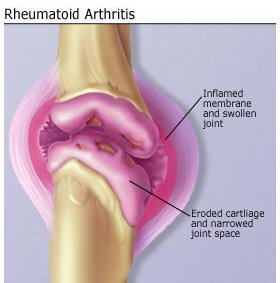Inflammatory Arthritis
Inflammatory arthritis usually affects several joints of the body at the same time. It is caused by an overactive immune system  whereby the body attacks its own tissues (autoimmune disease), resulting in joint inflammation. Arthritis caused by inflammation is often associated with pain and stiffness after periods of rest or inactivity. There can be swelling, redness, and warmth around the affected joints. Other organs of the body may be affected. Rheumatoid arthritis, psoriatic arthritis, and ankylosing spondylitis are types of inflammatory arthritis.
whereby the body attacks its own tissues (autoimmune disease), resulting in joint inflammation. Arthritis caused by inflammation is often associated with pain and stiffness after periods of rest or inactivity. There can be swelling, redness, and warmth around the affected joints. Other organs of the body may be affected. Rheumatoid arthritis, psoriatic arthritis, and ankylosing spondylitis are types of inflammatory arthritis.
The Social Security Administration is familiar with cases involving Rheumatoid Arthritis. About 1.3 million American have been diagnosed with rheumatoid arthritis. It is the most common type of inflammatory arthritis. Approximately 75% of rheumatoid arthritis patients are women. It is an autoimmune disease that involves many joints symmetrically (the same joint on both sides of the body). Rheumatoid arthritis is also associated with systemic effects (throughout the body). Even though most of the arthritis Social Security rules for arthritis seem to target rheumatoid arthritis, other types of arthritis are covered by the same rules.
One of the most important things that can be done in these types of cases is to have a rheumatologist that is willing to give details about functional limitations. Sometimes, the Social Security Administration does not give significant weight to general practitioners attempting to diagnose inflammatory arthritis. The Social Security Administration considers the gap in knowledge between a rheumatologist and a general practitioner very great. One reason the Social Security Administration places a great deal of confidence in the opinion of a rheumatologist over a general practitioner, is simply because there are other inflammatory conditions that are similar in appearance to that of rheumatoid arthritis. In fact, there are several diseases that can masquerade as rheumatoid arthritis. This makes rheumatoid arthritis difficult to diagnose. These other diseases include: osteoarthritis, gout, fibromyalgia, other autoimmune diseases such as systemic lupus, and joint inflammation caused by infections. Therefore the diagnosis of inflammatory arthritis needs to be by a rheumatologist – it needs to be detailed and based on a long duration of medical treatment.
One strong sign that a person suffers severe limitations from rheumatoid arthritis is a prescription for prednisone, a powerful steroid. Prednisone has many severe side effects and it should not be prescribed lightly. The Social Security Administration is aware of the side effects of prednisone. There may be complaints of generalized weakness and fatigue.
- Morning stiffness lasting for a half-hour or more
- Joint pain
- Joint tenderness
- Joint swelling
- Joint heat
- A history of arthritis beginning first in the wrist and hands
- Unexplained generalized weakness and fatigue
If you have any of the above named symptoms, then there needs to be a presentation of the symptoms through your medical records and an opinion by your rheumatologist. One thing that really adds to the strength of an arthritis case, is the ability to show a positive blood test for the disease. The rheumatoid factor test is a commonly ordered test to help diagnose rheumatoid arthritis. This test measures an antibody in the blood of people with rheumatoid arthritis. The rheumatoid factor blood test is eventually positive in 70% to 80% of people with rheumatoid arthritis, although in the early arthritis stages, the percentage may be much smaller. Sometimes, the rheumatoid factor may be elevated in other autoimmune diseases besides rheumatoid arthritis. This reinforces the notion that a proper diagnosis needs to be made by a rheumatologist and not a general practitioner.
Common Medical Tests for the Proper Diagnosis of RA:
| Rheumatoid factor test | detects antibodies in the blood |
| CBC (complete blood count) | Looks for anemia |
| ANA (antinuclear antibody) | Looks for antibodies |
| SED rate and CRP (C-reactive protein) | Looks for inflammation |
| Anti-CCP | Looks for antibodies |
| X-rays, MRIs, and ultrasound | Looks for changes in the joints |
If you are over the age of 50 and have a mixture of the above mentioned evidence, you should have no problem in presenting a strong case to the Social Security Administration. If you are under the age of 50, in addition to the above mentioned evidence, you will need to show some of the following signs and symptoms: severe fatigue, fever, malaise, involuntary weight loss, marked limitation of activities of daily living, marked limitation in maintaining social functioning or a marked limitation in completing tasks in a timely manner due to deficiencies in your ability to focus, to be persistent, or to keep a reasonable pace.
What Our Clients Say:
Member:

Attorney Gregory Kornegay
Greg is a trial attorney in Wilmington with over 30 years of experience. Greg was born and raised in southeastern North Carolina. Before law school he managed a store with employees making a payroll every week. His first job out of law school was as an Assistant District Attorney investigating and trying cases for the State of North Carolina. Through the years he has handled many different types of cases – including death penalty cases.
Being married with children has been a blessing and a challenge, but has served him well in understanding the problems individuals and families face as they live out their lives. Greg believes that each case is different and the needs of each client are unique, but there are certain themes of life that we all share.


